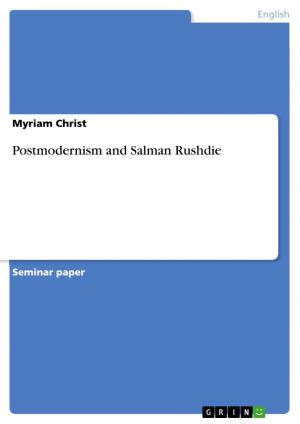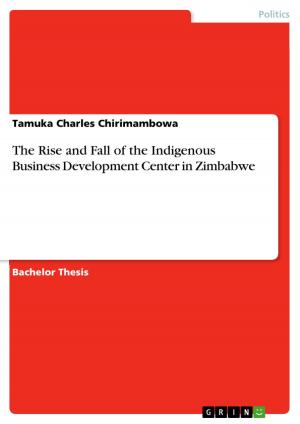A blanc check for intervention - the evolution of the Monroe Doctrine and its significance in contemporary U.S. foreign policy
the evolution of the Monroe Doctrine and its significance in contemporary U.S. foreign policy
Nonfiction, Social & Cultural Studies, Political Science| Author: | Michael Schmid | ISBN: | 9783638595544 |
| Publisher: | GRIN Publishing | Publication: | January 12, 2007 |
| Imprint: | GRIN Publishing | Language: | English |
| Author: | Michael Schmid |
| ISBN: | 9783638595544 |
| Publisher: | GRIN Publishing |
| Publication: | January 12, 2007 |
| Imprint: | GRIN Publishing |
| Language: | English |
Seminar paper from the year 2005 in the subject Politics - International Politics - Region: USA, grade: 1,3, Indiana University (Political Science Department), course: American Political Traditions, 13 entries in the bibliography, language: English, abstract: The Monroe Doctrine will be 200 years old in 2023 and the world of today could not be more different than from the conditions of the world in which president James Monroe gave his speech, which would become so famous and significant for the direction of U.S. foreign policy. Yet the policies of the Monroe Doctrine are still very much alive. Especially after president Theodore Roosevelt announced the Roosevelt Corollary to the Monroe Doctrine in 1904 America's path of becoming a major player in world affairs with arbitrary power was paved for them. The argument of this paper is that the document known today as the Monroe Doctrine started out as a simple but efficient and bold proclamation, which dealt with the problems of its time and has been transformed into a tool for global involvement. Originally it attempts to keep Europeans out of the New World but it does not attack the already existing colonies in the Western Hemisphere. Over time various presidents altered this original phrasing. One of the more important examples of this tradition is Theodore Roosevelt's Corollary to the doctrine, which will serve as an illustration to outline the main argument. Roosevelt turned the meaning of the doctrine around and went from noninterference to active responsibility by the United States to intervene anywhere in the Western Hemisphere where chaos and violence ruled. Still limited on the Western Hemisphere and whatever was defined to fit into this category Roosevelt's definition of the 'international police power' soon became just that. The United States would enter two World Wars on the basic justification that they were restoring order and justice and were only acting out of self-defense reasons. After World War II nothing of what James Monroe had once proclaimed as essential to American progress was left. The defining characteristic of Monroe's old doctrine-the non-interference with European affairs phrase-had been shattered to pieces. The Cold War forced the United States to become even more dedicated to European matters and even after the Cold War the U.S. or a multilateral coalition under U.S. leadership now dealt with new threats to European peace. With the post 9/11 era all dreams about isolation from Europe were forever destroyed. The War on Terrorism is the latest effort of the United States to change the conditions of countries all around the world.
Seminar paper from the year 2005 in the subject Politics - International Politics - Region: USA, grade: 1,3, Indiana University (Political Science Department), course: American Political Traditions, 13 entries in the bibliography, language: English, abstract: The Monroe Doctrine will be 200 years old in 2023 and the world of today could not be more different than from the conditions of the world in which president James Monroe gave his speech, which would become so famous and significant for the direction of U.S. foreign policy. Yet the policies of the Monroe Doctrine are still very much alive. Especially after president Theodore Roosevelt announced the Roosevelt Corollary to the Monroe Doctrine in 1904 America's path of becoming a major player in world affairs with arbitrary power was paved for them. The argument of this paper is that the document known today as the Monroe Doctrine started out as a simple but efficient and bold proclamation, which dealt with the problems of its time and has been transformed into a tool for global involvement. Originally it attempts to keep Europeans out of the New World but it does not attack the already existing colonies in the Western Hemisphere. Over time various presidents altered this original phrasing. One of the more important examples of this tradition is Theodore Roosevelt's Corollary to the doctrine, which will serve as an illustration to outline the main argument. Roosevelt turned the meaning of the doctrine around and went from noninterference to active responsibility by the United States to intervene anywhere in the Western Hemisphere where chaos and violence ruled. Still limited on the Western Hemisphere and whatever was defined to fit into this category Roosevelt's definition of the 'international police power' soon became just that. The United States would enter two World Wars on the basic justification that they were restoring order and justice and were only acting out of self-defense reasons. After World War II nothing of what James Monroe had once proclaimed as essential to American progress was left. The defining characteristic of Monroe's old doctrine-the non-interference with European affairs phrase-had been shattered to pieces. The Cold War forced the United States to become even more dedicated to European matters and even after the Cold War the U.S. or a multilateral coalition under U.S. leadership now dealt with new threats to European peace. With the post 9/11 era all dreams about isolation from Europe were forever destroyed. The War on Terrorism is the latest effort of the United States to change the conditions of countries all around the world.















